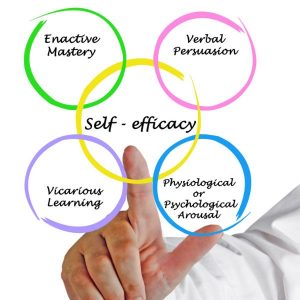Self-efficacy plays a critical role in shaping the way individuals with disabilities perceive their abilities and approach their daily activities. For wheelchair users, self-efficacy is especially important as it can impact their level of independence, social participation, and overall well-being. Research has shown that individuals with higher self-efficacy are more likely to achieve their goals, engage in physical activity, and cope better with the challenges of living with a disability.
What can occupational therapists and healthcare providers do to help build self-efficacy in their patients and loved ones?
Encourage Small Wins
Encouraging small wins is a powerful way to build confidence in wheelchair users. When setting goals, it’s important to make them achievable and realistic, as this can help individuals with a sense of accomplishment and progress towards larger goals. For example, a wheelchair user who is learning to transfer from their wheelchair to the bed may initially aim to perform the transfer with assistance from a caregiver. Once they achieve this goal, they can work towards transferring with minimal assistance, or even independently. Celebrating these small wins, either with verbal praise or a reward, can help reinforce positive behaviors and build confidence.
Encouraging small wins can also help individuals overcome obstacles and setbacks, which are inevitable in the rehabilitation process. By focusing on achievable goals, individuals can maintain a sense of control and motivation, even in the face of a challenge.
By celebrating progress, healthcare professionals can help to build resilience and confidence in patients’ abilities, and this can lead to greater self-efficacy and improved quality of life.
Emphasize Strengths
Focusing on what your patients can do, rather than what they cannot, can help them to feel capable and confident in their abilities. This approach can also help shift the focus from disability to ability, promoting a more positive self-image and improving overall well-being.
As healthcare providers, it’s important to take a strengths-based approach when working with wheelchair users. This involves identifying and highlighting the patient’s unique abilities, skills, and talents and incorporating these into their rehabilitation plan. For example, if a patient is an avid painter, incorporating art therapy into their treatment plan can not only help them develop their artistic skills but also provide a sense of accomplishment and enjoyment.
By emphasizing strengths, we can help to challenge negative self-perceptions and foster a sense of resilience and empowerment. This approach encourages patients to understand their abilities and take an active role in their rehab journey, leading to improved self-efficacy and a more positive outlook on life.
Provide Opportunities for Choice
By giving patients a say in their own care and rehabilitation, healthcare providers can help to promote a sense of control and empowerment, leading to improved self-efficacy. Offering choices can take many forms, from allowing patients to choose between different treatment options to provide them with opportunities for self-directed learning and problem-solving. For example, a healthcare provider might offer a wheelchair user a choice between different types of assisted devices or ask them to participate in goal setting and decision-making about their rehabilitation plan.
By giving patients a choice, we can help to foster a sense of autonomy and independence in our patients. This is particularly important for patients who may feel a loss of control due to their disability. By promoting a sense of ownership and control over their own care, we can help individuals to feel more confident in their abilities and better equipped to manage their condition.
Encourage Active Problem-Solving
Encouraging active problem-solving is a key strategy for promoting self-efficacy in wheelchair users. By empowering patients to take an active role in finding solutions to the challenges they face, healthcare providers can help to build problem-solving skills and foster a sense of pride in their abilities.
Encouraging this behavior can have numerous benefits for wheelchair users. It can help them to develop a more positive outlook on their abilities, improve their coping skills, and promote a sense of self-determination and empowerment. It can help to build resilience and confidence in the face of challenges, and this can lead to improved self-efficacy and overall well-being.
Foster a Growth Mindset
A growth mindset involves seeing challenges as opportunities to learn and grow, rather than as obstacles to overcome. This perspective can help individuals to develop a more positive outlook on their abilities and promote a sense of self-perseverance in the face of difficulties.
As healthcare providers, we can encourage wheelchair users to reflect on their experiences and identify opportunities for learning and growth. This may involve asking patients to think about what they have learned from a certain challenge or encouraging them to set goals for themselves that promote growth and development.
Fostering a growth mindset is incredibly important for promoting self-efficacy in wheelchair users. By encouraging patients to view challenges as opportunities for growth, we can help to build resilience. This can lead to improved motivation, better-coping skills, and a more positive outlook on life.
Use Positive Self-Talk
Positive self-talk involves using encouraging and supportive language to boost the patient’s confidence and self-esteem. For example, a patient might repeat affirmations such as “I can achieve my goals” or “I am strong and resilient”. This can help to counteract negative thoughts and promote a more positive self-image.
By using positive self-talk, patients can build confidence and strength, which can contribute to an increase in self-belief. It can also promote a more positive outlook on life and help individuals to feel more empowered and in control.
Connect with Others
Building connections with peers who share similar challenges can provide a sense of community and support, which can contribute to a more positive outlook. Connecting with others can take many forms, such as joining support groups, attending events, or participating in online forums. By connecting with others, patients can share experiences, learn from each other, and build relationships that offer encouragement and support.
By utilizing these techniques, we can empower our patients and loved ones to take control of their health and rehabilitation journey, leading to improved independence, confidence, and overall quality of life. As occupational therapists, and healthcare providers it is our goal to help our patients reach their full potential and live their best lives.



